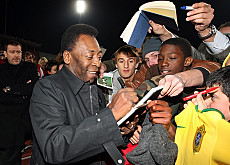Swiss keeps North Koreans on the ball

Swiss football coach Andy Egli sees enormous potential for North Korean players if they learn to take more individual responsibility on the pitch.
Egli has just returned from two months in the Communist country’s capital Pyongyang, where he worked as an instructor for the Zurich-based world football federation, Fifa.
Do you remember Pak Doo Ik? North Korea’s number seven who scored the winning goal against Italy during a group match of the 1966 football World Cup in England. More than 40 years on, North Koreans still have fond memories of the biggest upset in the history of the championship.
Egli says he met a coach who could still name a handful of players from the line-up of the extraordinary match in Middlesbrough against Italy’s giants Mazzola, Rivera, Facchetti and Albertosi.
“The coaches and players I worked with are certainly familiar with Pak Doo Ik, but most of them were not even born in 1966,” he told swissinfo.
Several young talents caught Egli’s eye during his stint as instructor of two university football teams in North Korea’s capital. He would like to bring an 18-year-old North Korean to Europe, but he’s aware that such a move needs careful preparation: the player basically needs to be looked after round-the-clock.
“It’s a huge change for most people from Asia to get used to the western way of life – even more so for people from North Korea,” he said.
Korea change
His own fascination with Asia goes back a long way and is linked to a personal friendship with a Swiss expatriate and his South Korean wife and family. He went to see them years ago and spent 12 months as coach of the K-League team Busan I’Park during the 2006/2007 season.
During a visit to Korea’s demilitarised zone he caught a first glimpse of North Korea. “Wouldn’t it be great to go to North Korea one day?” he thought, looking across the fence past the military police patrols.
But the welcome he was given as Fifa instructor in Pyongyang a few months later left him stunned and was a real test for Egli’s taste of adventure.
His mobile phone was confiscated and he had no access to email in his hotel. What’s more, he was told by officials that more than 50 players and coaches were waiting for his first session the following morning.
This is not what he had expected, although contacts between Fifa and the North Korean football association had not exactly been smooth in the weeks before.
“There I was, no time to look around and get my bearings,” says Egli and laughs. The first weeks were tough, but he gradually began to get used to the North Korean mentality and way of tackling things.
“It was a different world for me at the beginning,” he said. “I hadn’t experienced anything like that before in my life.”
Another world
He saw the broad streets but hardly any traffic, people in uniform everywhere, gigantic monuments and statues in the city. His freedom of movement was restricted – there was no way he could leave the hotel at night.
The infrastructure at the football stadium was not always up to scratch, getting new markers for theory lessons was a major undertaking and the only proper ground was an artificial pitch.
“The footballs we used looked like they were from the 1970s. The discrepancy between the best and the weakest team members was enormous.”
But Egli was impressed by the determination of most young players to learn and their ability to focus.
He is convinced that North Korea’s footballers will improve and be competing with the best teams – within 20 to 30 years.
Stars
Egli’s personal highlight during the summer in North Korea was a visit to the mausoleum of Kim Il-sung, the late leader of the Communist country.
Queuing with thousands of North Korean citizens, he wondered how so many people could have so much adoration for a single person.
There was another experience that made him realise how far apart the west and North Korea are. He decided to tell his students about football in the west and the star system.
“Ten minutes into my lecture I noticed the blank stares in the classroom,” he said.
It dawned on him that, having grown up in an egalitarian collective society, his students had no idea what a star or celebrity was.
“But after a while some of them came up with the names of Ronaldo and Zidane, but also Rockefeller.”
What did he tell them about Switzerland? Egli says he mentioned the mountains, the lakes and rivers.
“They were most keen to know how such a small country like Switzerland manages to keep up with more important countries.”
Well, almost. Switzerland are 45th in the latest Fifa ranking, more than 60 places ahead of North Korea.
swissinfo, Urs Geiser
Fifa has a pool of about 300 experts for projects to help countries in Asia, Africa, Central America and Oceania train coaches, players and referees and provide technical and medical support.
The development programmes were launched in 1975 and received a massive financial boost in 1999 when Fifa invested its marketing revenue from the World Cup into projects.
Andy Egli was the first western instructor to spend two months as a Fifa expert in North Korea.
The 50-year-old Swiss won five Swiss championship titles and four Cups and 77 caps for the Swiss national team. He also played for the German club Borussia Dortmund.
His career as a coach began in Switzerland in the mid-1990s and led him to Germany and South Korea.

In compliance with the JTI standards
More: SWI swissinfo.ch certified by the Journalism Trust Initiative











You can find an overview of ongoing debates with our journalists here . Please join us!
If you want to start a conversation about a topic raised in this article or want to report factual errors, email us at english@swissinfo.ch.